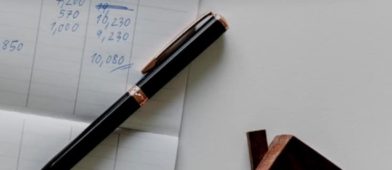An engagement ring is a big step. It’s also a big purchase.
Maybe you have enough cash on hand if you tap into your emergency fund. Maybe you don’t.
There’s no arguing that when you buy an engagement ring, diamond or otherwise, it’s best to pay cash. If that isn’t you, or at least not you right this moment, what are some financing options available to a would-be buyer?
Before we get into how you will pay for it, make sure you’re buying a diamond the right way. Read our guide on how to buy an engagement ring online as well as how much you should spend on an engagement ring – the rule of thumb of 2-months salary is outdated! – so you’re making the right decision.
Jewelry stores will offer two financing options – a short-term loan and deferred financing.
Table of Contents
Short-term loan from the jeweler
Financing from the jewelry store is going to be competitive, it’s not like at a car dealership, and fairly standard across the industry with some minor variation.
James Allen (full review) offers a 9.90% APR for 2 years, then it goes to the Standard Purchase APR (currently 29.99%), for any purchase over $2,000. Financing is issued by TD Bank, N.A.
Brilliant Earth offers to finance in the form of a credit card promotion. It’s deferred financing via a Wells Fargo Jewelry Advantage credit card of 0% No Interest if Paid in Full within 12 months. (they also offer layaway)
Finally, Blue Nile offers 9.99% APR if paid in full within the terms of the loan, which vary based on the purchase amount:
- $2,000 – $2,999.99 purchase – 24 month term loan
- $3,000 – $3,999.99 purchase – 36 month term loan
- $4,000 and up purchase – 48 month term loan
- $6,000 and up purchase – 60 month term loan
Afterward, the rate goes to the Standard Purchase APR (currently 29.99%). Financing is as a credit card and offered by Comenity Capital Bank.
Most private loans are only for 3-5 years, so these offer a two-year low-interest rate that goes up to a higher rate similar to credit cards. Depending on your payment rate and the interest rate you’d get on a private loan, these may be superior to a private loan.
Sometimes you’ll see these referred to as an engagement ring payment plan but they’re legally structured as a loan. A payment plan often refers to an agreement by which you make regular payments before you take ownership, similar to layaway, but these are actual loans. Your credit history will be pulled and your score will be used to determine approval and interest rates.
Deferred finance is not the same as 0 percent
Deferred financing is a special type of financing. Anytime you have a purchase in the several thousand dollar range, you’ll see stores offer deferred financing. The amounts are often too low for a larger loan, like a car loan, but they’re too high for you to want to put on a credit card.
Deferred financing is when you get several months of 0% interest that will accrue when the deferred financing period ends. If you pay off the entire loan before the period ends, you owe no interest. If you don’t, all of that interest will accrue and appear on the loan balance.
Let’s say you make a purchase of $5,000 and get 0% deferred financing for 12 months and that financing has a Standard Purchase APR of 28.99%. The amount of interest that gets added after the year depends on the payments you make:
- If you make absolutely no payments, on the 366th day (one year + 1 day), you will owe $6449.50 – $5,000 plus $1,449.50 in interest.
- If you make a few payments, but not all of them, then the Standard Purchase APR is applied to the amounts left based on when you made the payments.
- If you pay off the entire $5,000 within the 12 months, you will owe no interest whatsoever.
What trips people up is the “deferred” part – many buyers don’t realize that the interest is deferred and not interest-free.
The only way to get truly 0% financing is to get a credit card with a 0% APR on purchases promotion, then purchase with that credit card.
When you apply for a card, you need to make sure that it has a high enough balance to cover the cost of the ring. You may want to apply for the card ahead of the purchase and then request a credit limit increase if it’s necessary. You will have to call in and manually request one because issuers will rarely permit an increase for a new cardholder.
The big risk with this approach is that you don’t pay off the credit card before the promotional 0% APR interest rate expires. However, with a credit card, the interest is not deferred. If you don’t pay it off, you just owe interest on the balance amount whenever the period expires. There’s no big slug of interest heaped on you. Credit card interest rates are also going to be comparable to whatever the deferred financing rates are.
One other consideration is that many credit cards offer a sign-up bonus when you spend a certain amount within the first few months, a diamond engagement ring usually is enough to cover the entire purchase requirement. You can find a credit card offer that appeals to you and even save a few hundred bucks (by getting it as cashback or a gift card) on the purchase in this unorthodox way.
Also, you could, at the end of the 0% APR promotional period, open a new credit card with 0% on balance transfers and continue the 0% ride.
Personal loans can be expensive
If the 12-month window for deferred financing is too short and you don’t think the 0% on purchases credit card will work, the last resort is a personal loan from a third-party financial institution.
Personal loans are typically 3-years with interest rates in the low to high teens, depending on your credit score, with no 0% promotional period. They’re expensive because they’re unsecured and the absence of a promotional period means you’re paying interest immediately.
You will need a decent credit score and history. If your score isn’t great, this may be a very bad option because interest rates will be over 20% for the weakest credit histories. If your score is good, give it a look because you can get some favorable rates.
You can search using a marketplace like Monevo to see what your actual rates will be before you decide if it’s a good option.
If you bank with a credit union, check there first because they offer the most competitive rates. Otherwise, do more research online to see which banks offer the best rates for you.
✨ Related: Wedding Ideas on a Budget
The best financing option
If you can qualify for the 0% deferred financing at the jewelry store AND you can pay off the cost of the engagement ring within the promotional period (usually 12 months), then the 0% deferred financing offer is the best way to finance your ring and pay no interest.
If you can’t, the next best option is a toss-up between a new credit card that offers 0% APR on new purchases and a short term loan (3-5 years) with a reasonable interest rate. With the credit card option, you get a 0% interest for the promotional period and then a regular interest rate for the balance. This interest rate will be lower than the deferred financing rate.
As for the short-term loan, this option will depend a lot on your credit score because interest rates will vary widely on this type of unsecured loan.
Conclusion
A lot of personal finance experts will try to be sanctimonious and say under no circumstances should you get a loan. I personally agree with that thought but let’s be real, that’s not going to be helpful.
You want an engagement ring and if it’s financially out of reach right now, a loan maybe your best option. Look at the list of alternatives and see which one fits your financial plan best.




I am one of those annoying PF people who think that an engagement ring shouldn’t be financed 😉 If a girl expects a $35,000 engagement ring that’s not the right girl for you! (Just speaking from experience, some of my friends have $35K rings but they did not ask for it from their boyfriends)
I edited that last bit, I should clarify that I don’t think anyone should get a loan but if they want one… it’s important to be educated about it.
Good write up Jim. If someone wants an engagement ring, and don’t have the cash for it or well-to-do family or friends to give them money, then they’re likely going to have to borrow a loan. Loan terms vary in terms of length and interest rates, but it goes without saying that getting the lowest interest rate possible for the longest amount of time is preferable. But, given the importance of an engagement ring, and the life-changing experience it represents, I’m fully supportive of finding the right ring without sacrificing too much on the cost.